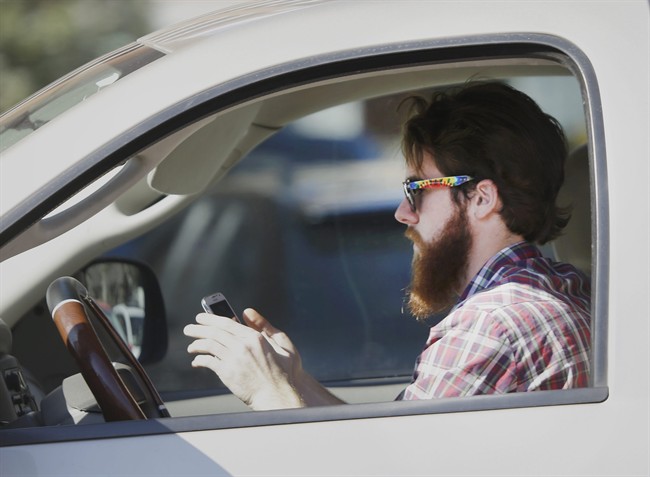HALIFAX – Many Nova Scotians are hitting the roads this Christmas but they may want to double check what they use when they’re behind the wheel.

Global News looked into what drivers are and are not allowed to use and what we found was surprising.
The Motor Vehicle Act states “It is an offence for a person to use a hand-held cellular telephone or engage in text messaging on any communications device while operating a vehicle on a highway.”
The definition of use includes using the GPS on the phone, using iTunes, reading email or sending text messages, according to Cst. Pierre Bourdages of Halifax Regional Police.
“If you have to use or touch your cell phone, it’s against the Motor Vehicle Act,” he said.
“If you have to do that, pull over to the side of the road in a parking lot.”
However, Bourdages said the law does not apply to other electronic devices such as iPods, iPads or GPS devices.
“We’re not recommending it but there’s nothing against it in the Motor Vehicle Act.”
Bourdages said officers can pull motorists over for such actions but do not issue tickets because they are not illegal.
- Life in the forest: How Stanley Park’s longest resident survived a changing landscape
- ‘They knew’: Victims of sexual abuse by Ontario youth leader sue Anglican Church
- Carbon rebate labelling in bank deposits fuelling confusion, minister says
- Buzz kill? Gen Z less interested in coffee than older Canadians, survey shows
However, he stressed that a driver’s attention needs to be on the road.
“Your concentration should be on the road with everything that’s happening, pedestrians, other users on the road, changing road conditions.”
Tom Furlong, the regional director of Young Drivers of Canada – Nova Scotia, said he teaches his students not to use anything else while behind the wheel.
“They’re not a part of the task of driving and driving needs your 100 per cent concentration,” he said.
“There’s enough distractions on the road. Why would you want to self-inflict distraction? It doesn’t make sense.”
Furlong suggests turning cell phones off while driving or putting phones in the back seat or trunk of a vehicle to eliminate the risk of picking it up.
He said knowing the difference between right and wrong on the roads should be common sense.
“There’s being legal then there’s being not too bright.”
Right Lane Driver Training Driving Instructor Gary Spears said he teaches his students to be defensive.
“Adding another device in their hand in the car, that’s going to distract you. Adding another task for you to deal with is going to have some bad results,” he said.
“Driving requires your full attention and you don’t need to deal with those things. Deal with those things when you’re actually stopped.”
Spears’s students said they don’t think motorists should use any devices at all.
“I think they should all be illegal because they all put someone in trouble and they’re all unsafe,” said Mohammed Jaber, 16.
“You need your attention on the road or you’re going to cause accidents and you’re going to kill someone,” said Julia Standing, 20.




Comments